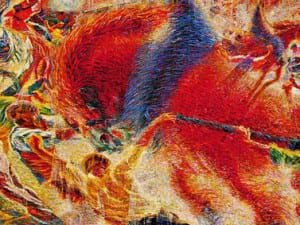In How to Read the Air Dinaw Mengestu explores family relationships and one man’s need to reinvent the past, present and future in order to deal with memories from his childhood.
In 2007 American author, Dinaw Mengestu (b. 1978), published his debut novel to worldwide critical acclaim. Mengestu was born in Addis Ababa, Ethiopia, and now currently resides in Paris. As well as being an award-winning author, Mengestu has written for Rolling Stone, Harper’s and The Wall Street Journal. His first novel, Children of the Revolution (released with the title The Beautiful Things That Heaven Bears in the United States) was translated into more than a dozen languages and won numerous awards around the globe, including the Guardian First Book Prize, the Los Angeles Times Book Award and France’s Prix du Premier Roman Etranger. In 2010, Mengestu was also included in the New Yorker’s “20 under 40” list of writers to watch. In January his second novel, How the Read the Air, will be published in the UK having already garnered rave reviews in America. This moving novel about love, family and the power of immigration fully establishes Mengestu’s reputation as one of the rising stars of his generation.
How to Read the Air tells the story of Yosef and Mariam Woldemariam, young Ethiopians who have spent all but their first months of marriage apart. They are reunited in America where Yosef has found a job and bought a home in Peoria, Illinois. One early September afternoon, they set off on a road trip to Nashville on what is meant to be a belated honeymoon, but it has far deeper importance as a journey in search of their identities, as a new American couple. 30 years later, Yosef has died and the couple’s son, Jonas, is desperate to make sense of the volatile generational and cultural ties that have forged him. Leaving behind his marriage and job in New York, Jonas sets out to retrace his parents’ trip, and in a stunning display of imagination, weave together a family history that takes him from the war-torn Ethiopia of his parents’ youth to a brighter vision of his own life in contemporary America, a story – real or invented – that holds the possibility of reconciliation and redemption.
After being introduced to Jonas, it gradually emerges that his reliability as a narrator is questionable. He is prone to evasion, exaggeration and fabrication, not only in the retelling of his parents’ story, but also in his own life. His marriage is failing, his career as a high school English teacher is foundering and the only advantage of his chronic lying is in his previous job at an immigration agency, where he polishes and shines immigrants’ stories so that they might be given asylum. However, Mengestu’s handling of Jonas reveals depths and complexities that show him to be far more than just someone who is shy of the truth, as he explains: “Jonas is first and foremost a storyteller, I think. Rather than seeing the world as a fixed, solid thing, reality for him is malleable. The past can be reinvented and imagined to be better than it actually was. At the same time, any present threat or danger can be avoided by a similar act of imagination. This willingness to invent and remake both past and present is both Jonas’s demise and saving grace. It’s what allows him to get at truths that are more essential than the concrete facts that often make up a narrative, and at the same time it’s also what keeps him incapable of confronting life’s challenges head on.”
It soon becomes clear that the reason for Jonas’ behaviour stems from his traumatic childhood. His upbringing and treatment at the hands of his father in particular have turned him into a man for whom it is easier and safer to hide behind stories than it is to confront his own emotions, and the truth that may or may not be found there. On the one hand, Jonas is simply a son trying to imagine what his parents might have been like, on the other he is a man desperately seeking release through understanding from a past overcast by his father’s shadow – more often than not the shadow of a hand raised to strike. As a child, Jonas learned to be invisible, to be unseen, unheard and therefore unacknowledged. He carries this into an adulthood, where he chooses to speak little, to keep his past hidden from those closest to him and to invent a past, present and future that suits his current needs. However, this way of living his life is unsustainable – in order to move forward he must begin to understand his past, and more specifically his father.
As with Jonas, Mengestu’s approach to Yosef is far from straightforward. At first he comes across as a mean spirited and brutal man, but as the novel progresses and his past is revealed, it is hard not to feel at least a degree of compassion for this man’s ordeal whilst getting to America, but also what he left behind. It is a testament to Mengestu’s talent as a writer that Yosef elicits sympathy, albeit tinged with aversion to his behaviour towards his wife and young son. A large part of this mixed and complex reaction to this character derives from the fact that Mengestu always saw and thought about Yosef through Jonas’ eyes, as he explains: “Jonas is damaged, scarred, and bruised by his father’s violence, and yet there was always a note of compassion in his rendering of his father that kept Yosef from being a simple caricature of a violent, angry man. It’s because Jonas is so desperate to understand how his father came to be the man he knew him to be that there are these consistent moments of grace that he extends to his father that make him perhaps not sympathetic, but I hope tragic.”
Mengestu explores tragedy from a different angle with his portrayal of a woman displaced from her cultural heritage, her status and her home. Jonas’ mother, Mariam, is a fascinating portrait of a wife and mother who sacrifices everything for her child. Mariam suffers at the hands of her husband until Jonas is old enough to leave home and make his own way in the world. At this point, she all but disappears from both Yosef’s and Jonas’ lives simply to be alone. Her final outward rejection of her son makes her a difficult character to like, but Mengestu defends her behaviour and points out that although she is not loveable, she is far from just a victim in the story of her own life: “There is a distance and coldness to her, but she also spends a large part of her adult life in a violent, loveless marriage for the sake of her son. Perhaps that’s not enough to make her sympathetic, but I hope it’s enough to explain why a woman like her, with her own abandoned dreams of a better and more interesting life, would seek out so much solace and solitude later in her life, when she’s finally free from the marriage that has defined and shaped her life.”
Towards the end of the novel, we find out that Mariam and Yosef never talked to each other about their past lives in Ethiopia. This unwillingness or inability to share past experience, however easy it is to understand Yosef’s reluctance to recall his, brings into question the importance of remembering our heritage, to feel rooted in our own personal and social histories, in order to move forward with our lives. This issue of remembering is one that is vital to Mengestu’s storytelling: “We are historical creatures – we have memories, we have narrative – all these things that give weight and meaning to our present lives, and so for me, and definitely for the characters in my novels, an understanding and reckoning with history is vital not only to moving forward with our lives, but also with coming to terms with it.”
How to Read the Air is a novel that takes a range of themes such as belonging, the act of remembering, identity and the sense of self and creates a remarkable piece of fiction that stays with the reader long after finishing the last page. The carefully nuanced prose, precise storytelling and well-crafted characters draw you into a world that is as tragic as it is rewarding. The novel has a measured pace, no scene is rushed as Mengestu takes his time to tell his tale. Ultimately, the resounding message is that although we need to acknowledge our personal histories, we also have to be careful not to get lost in our own stories and should always strive to move on with our lives. In the end, Jonas reaches an understanding of his parents that finally frees him from his past whilst simultaneously rooting him in it.
How to Read the Air by Dinaw Mengestu was published by Jonanthan Cape in January 2011. www.randomhouse.co.uk.
Rachel Hazelwood





